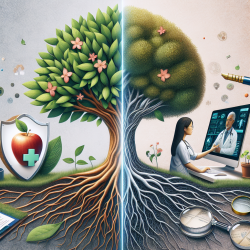The concept of "food is medicine" is gaining momentum in the healthcare industry as a promising approach to combat diet-related chronic diseases. This innovative idea emphasizes the integration of nutrition into patient care, offering a new perspective on how we can manage and prevent illnesses through dietary interventions. As a practitioner, understanding and implementing these strategies can significantly enhance your ability to deliver comprehensive care.
Understanding Food as Medicine Interventions
The research article "Food is medicine: actions to integrate food and nutrition into healthcare" highlights several interventions that have been piloted with success. These include:
- Medically Tailored Meals: Fully prepared meals designed based on individual assessments, typically for patients with complex medical conditions who cannot shop or prepare meals themselves.
- Medically Tailored Groceries: Non-prepared grocery items selected by nutrition professionals as part of a treatment plan for patients who can cook but need specific dietary support.
- Produce Prescriptions: Vouchers or debit cards for free or discounted produce, aimed at patients at risk for diet-related conditions.
These interventions are often provided at low or no cost to patients and are funded by healthcare systems, governments, or philanthropic organizations. They aim to improve patient outcomes by addressing nutritional needs directly through the healthcare system.
The Role of Practitioners in Implementing Nutrition Interventions
As a practitioner, your role in implementing these interventions is crucial. Here are some steps you can take to enhance your skills and integrate food as medicine into your practice:
- Educate Yourself: Stay informed about the latest research and developments in nutrition and healthcare. Attend webinars, conferences, and read publications to deepen your understanding of how food can be used as a therapeutic tool.
- Collaborate with Dietitians: Work closely with registered dietitians to develop personalized nutrition plans for your patients. This collaboration ensures that dietary recommendations are tailored to individual needs and conditions.
- Advocate for Nutrition Education: Encourage medical institutions to incorporate more nutrition education into their curricula. This will ensure that future practitioners are better equipped to address dietary needs in patient care.
- Pilot Nutrition Programs: Consider initiating pilot programs within your practice or community to test the effectiveness of food as medicine interventions. Collect data and share findings with peers to contribute to the growing body of evidence supporting these approaches.
The Benefits of Food as Medicine
The integration of food as medicine into healthcare has numerous benefits:
- Improved Health Outcomes: Patients receiving medically tailored meals or produce prescriptions often experience better management of chronic conditions such as diabetes and cardiovascular disease.
- Cost Savings: By reducing hospital admissions and emergency room visits, these interventions can lead to significant savings for healthcare systems.
- Disease Prevention: Access to nutritious foods can prevent the onset of diet-related diseases, improving overall public health.
The Need for Further Research
The potential of food as medicine is vast, but more research is needed to fully understand its impact. Practitioners are encouraged to participate in studies and advocate for funding to explore the long-term benefits of these interventions. By contributing to this research, you can help shape the future of healthcare where nutrition plays a central role in disease prevention and management.
If you're interested in delving deeper into this topic, I highly recommend reading the original research paper: Food is medicine: actions to integrate food and nutrition into healthcare.










